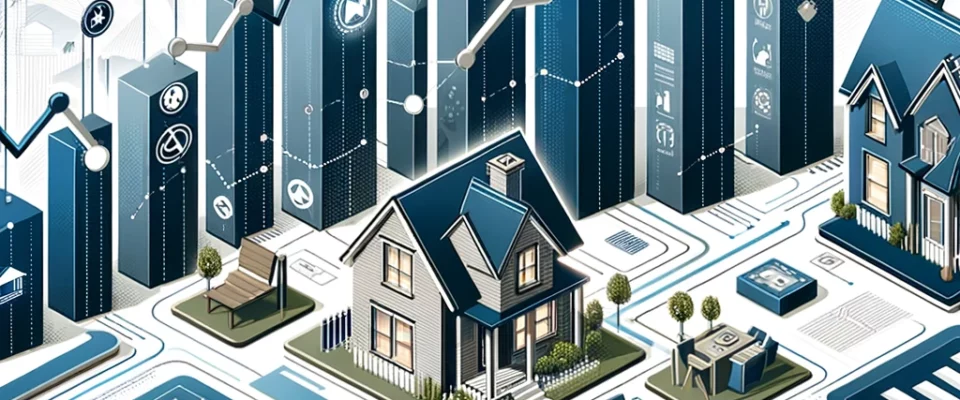With the development of internet technology, the familiar processes of buying and selling goods are undergoing a major transformation. E-commerce has not only changed the retail industry, but has also begun to impact other industries, including the real estate market. This impact is multi-layered and affects various aspects of supply and demand.
New opportunities for sellers and landlords
- Global access to buyers: online platforms remove geographical restrictions, allowing sellers and landlords to offer their properties to a wide audience outside their region or country.
- Automate sales and leasing processes: CRM systems and other automated solutions help to streamline record keeping, referrals and customer interactions, reducing time and effort on routine operations.
- Instant updates on real estate information: Technology allows for quick updates on the status and value of properties, which speeds up the decision-making process for prospective tenants and buyers.
- Integration of virtual tours and 3D modeling: Online platforms offer tools to create virtual tours of properties, increasing their appeal and helping them stand out from the competition.
- Personalized Marketing: Vendors can use data on user behavior to create targeted advertising campaigns, increasing the effectiveness of marketing efforts and the likelihood of a transaction.
- Reviews and Ratings: Review systems on platforms not only help buyers make choices, but also incentivize sellers to maintain high quality of service and condition of properties.
Changing buyer preferences
With the advancement of online technology, home buyers are rethinking their selection criteria. Today, they evaluate the availability and completeness of real estate information, as well as the convenience of interactive features on agency websites and platforms.
Electronic tools that allow you to virtually inspect the objects or read the full history of housing, are becoming scarce in the market.
Buyers want to make sure that the location of the property fits their lifestyle, educational facilities, medical centers and transportation accessibility. They are also more attentive to the energy efficiency of housing and the availability of modern technology, which used to take a back seat.
Transforming investment strategies
Investors are actively integrating digital data into their analytical models to better understand and predict market trends. The use of machine learning algorithms to analyze large volumes of data makes it possible to identify promising regions and investment targets with high value growth potential. Investors are also becoming more selective in choosing objects, preferring those that can easily adapt to changes in the market, such as apartments with the possibility of redevelopment for remote work or housing in areas with developed infrastructure. This entails increased investment in digital platforms for transaction and asset management, which makes the process more transparent and minimizes risk.

Impact on housing costs
The penetration of e-commerce is leading to significant changes in real estate valuation. Increased availability of information and transparency of transactions makes the market more competitive. Buyers equipped with comprehensive data on pricing, sales history and current trends can make more informed decisions. This, in turn, forces sellers and developers to offer more competitive prices and terms. Digital tools and platforms also enable the realization of more dynamic pricing that adapts to real-time changes in demand. Additionally, increased interest in housing in certain regions may stimulate rapid price growth, while in other areas prices may stabilize due to improved access to market information.
Emergence of new professions and competencies
The digitalization of the real estate market requires new knowledge and skills from professionals. Demand is growing for professionals who can work with big data, manage digital assets and integrate technology into traditional processes. This includes data analysts, digital marketing specialists and digital security experts.
There is an emerging need to train existing employees in new technologies to make them more competitive in the market. Universities and education platforms are starting to offer specialized programs and courses aimed at developing the necessary skills in digital real estate.
This is leading to a new generation of professionals capable of managing complex projects and using digital tools to optimize real estate business processes.
Increasing requirements for transparency and security of transactions
The use of blockchain technology is beginning to play a critical role in ensuring reliability and compliance, as every transaction is recorded in an immutable digital ledger. This helps avoid document forgery and fraud in transactions. Also, the proliferation of artificial intelligence in real estate is facilitating the automation of due diligence, risk analysis and assessing the adequacy of value. Regulators are focusing on strengthening legislative and regulatory frameworks aimed at protecting the rights of consumers and investors, which includes requirements to disclose full information about transactions and participants. These measures significantly increase confidence in digital platforms and contribute to an increase in online transactions.
FAQ
The use of online platforms removes geographical barriers by providing access to potential customers from different parts of the country or even the world.
Virtual tours and 3D modeling tools allow potential buyers and tenants to view properties remotely, enhancing their perception and increasing the chances of a transaction.
Buyers prefer properties that provide detailed data online, including transaction history and the current condition of the property. This forces sellers to offer more transparent and complete data, which affects the sales and rental processes.

